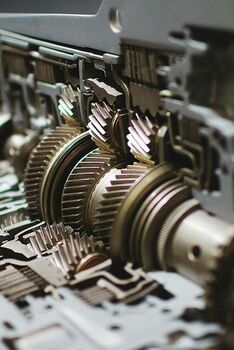Mechanical tranmission

⚙️ Mechanical Transmission System Description
A mechanical transmission system is a crucial component in machinery and equipment that is responsible for transmitting power from a source (like a motor or engine) to a target (such as wheels, shafts, or actuators). It ensures the efficient conversion of torque and speed to match the specific requirements of the machine or application.
🛠️ Key Functions:
- Transfers mechanical energy efficiently
- Adjusts speed, torque, and direction of motion
- Ensures synchronization between input and output components
- Protects equipment from overload using safety mechanisms
🔩 Core Components:
- Gears: Spur, helical, bevel, and worm gears for speed and torque variation
- Shafts & Couplings: Transmit rotational power and align misaligned parts
- Belts & Pulleys / Chains & Sprockets: Flexible power transmission options
- Clutches & Brakes: Control engagement and stoppage of motion
- Bearings & Bushings: Support moving parts and reduce friction
🧰 Types of Mechanical Transmission:
TypeDescriptionGear Drive | High efficiency and precision; ideal for speed and torque control
Belt Drive | Quiet and flexible power transmission with shock absorption
Chain Drive | Suitable for high-load, high-speed applications with minimal slippage
Shaft Drive | Common in automotive and heavy-duty systems for transmitting rotary motion
Belt Drive | Quiet and flexible power transmission with shock absorption
Chain Drive | Suitable for high-load, high-speed applications with minimal slippage
Shaft Drive | Common in automotive and heavy-duty systems for transmitting rotary motion
🏭 Industrial Applications:
- Automotive & heavy vehicles
- Manufacturing machines and CNC systems
- Conveyor and material handling systems
- Agricultural, textile, and packaging machinery
✅ Advantages:
- High mechanical efficiency
- Reliable and long-lasting
- Customizable to operational demands
- Low maintenance with proper lubrication and alignment
Let me know your target audience or product type (e.g., gearbox solutions, conveyor systems), and I can tailor this description even further.